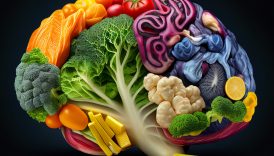From Plate to Prosperity: How Nutrition Impacts Your Life

Understanding Nutrition
Nutrition is the cornerstone of good health and well-being. It encompasses the processes by which the body takes in and utilizes food, and it serves a crucial role in our daily lives. Understanding nutrition means recognizing how different nutrients—such as carbohydrates, proteins, fats, vitamins, and minerals—work together to fuel our bodies. For instance, when someone eats a balanced meal filled with leafy greens, whole grains, and protein, they are not just filling their stomach; they are also arming their body with the essential tools to maintain energy levels throughout the day.
- From Plate to Prosperity: How Nutrition Impacts Your Life
- Understanding Nutrition
- Importance of Healthy Eating Habits
- The Impact of Nutrition on Physical Health
- Effects on Energy Levels
- Role in Disease Prevention
- Nutrition's Influence on Mental Health
- Relationship between Diet and Mental Well-being
- Nutrients for Cognitive Function
- How Nutrition Affects Weight Management
- Balancing Macronutrients
- Building a Sustainable Diet Plan
- Nutrition's Role in Enhancing Overall Well-being
- Boosting Immune System
- Promoting Longevity
- Social and Economic Implications of Nutrition
- Accessibility to Nutritious Food
- Cost of Healthy Eating
- Nutrition Education and Empowerment
- Importance of Nutrition Knowledge
- Making Informed Food Choices
- Cultural Perspectives on Nutrition
- Traditional Diets around the World
- Celebrating Food Diversity
- The Future of Nutrition Research and Innovation
- Advancements in Nutritional Science
- Technology's Impact on Dietary Trends
Importance of Healthy Eating Habits
Adopting healthy eating habits is vital for promoting overall well-being. Consistent nutritious choices can lead to:
- Enhanced energy and productivity
- Better mental clarity
- Improved immune function
Embracing these habits doesn’t have to be daunting. Small changes, like incorporating more fruits and vegetables into meals or opting for whole grains, can make a significant difference over time. In the long run, cultivating these habits can pave the way for a healthier, more vibrant life.
The Impact of Nutrition on Physical Health
Effects on Energy Levels
Nutrition plays a pivotal role in determining our energy levels. The foods we consume directly influence how we feel throughout the day. For example, a breakfast rich in protein and healthy fats—like eggs and avocado—can provide sustained energy, while sugary cereals might lead to a sudden spike followed by a crash. To maintain optimal energy levels, consider these guidelines:
- Choose Complex Carbohydrates: Foods like brown rice and oats release energy gradually.
- Incorporate Protein: Lean meats, beans, and nuts help keep energy steady.
- Stay Hydrated: Dehydration can lead to fatigue; drink plenty of water.
Role in Disease Prevention
Moreover, a balanced diet is crucial for disease prevention. Nutrients from whole foods can bolster the immune system and reduce the risk of chronic diseases. Key benefits include:
- Heart Health: Omega-3 fatty acids from fish can lower the risk of cardiovascular diseases.
- Bone Strength: Calcium and vitamin D from dairy products help build strong bones and prevent osteoporosis.
By making mindful food choices, individuals can significantly enhance their physical health and stave off potential health issues in the long run.
Nutrition’s Influence on Mental Health
Relationship between Diet and Mental Well-being
Nutrition doesn’t just fuel our bodies; it significantly influences our mental health as well. Research indicates that there is a strong correlation between diet and emotional well-being. For instance, individuals who regularly consume processed foods and sugars often report higher levels of anxiety and depression symptoms. Consider this: after trying a week of whole, nutrient-rich foods like fruits, leafy greens, and whole grains, many people notice boosted mood and increased productivity. The connection between what we eat and how we feel is undeniable.
Nutrients for Cognitive Function
Certain nutrients play a distinct role in enhancing cognitive function. To keep our minds sharp, it’s essential to include specific foods in our diet, such as:
- Omega-3 Fatty Acids: Found in fatty fish like salmon, these help improve memory and brain function.
- Antioxidants: Berries and dark chocolate combat oxidative stress, which can contribute to cognitive decline.
- B Vitamins: Foods rich in B vitamins, like whole grains and legumes, support brain health and can enhance mood stability.
By nurturing our bodies with the right nutrients, we can foster not only physical vitality but also uplift our mental health.
How Nutrition Affects Weight Management
Balancing Macronutrients
Nutrition is not just about what you eat; it’s also about how to achieve a balanced intake of macronutrients—carbohydrates, proteins, and fats. Each macronutrient plays a unique role in weight management. For instance, while carbohydrates provide immediate energy, protein helps build and repair muscles, which can boost metabolism. Healthy fats, like those found in avocados and nuts, support hormone production and satiety. To balance these macronutrients effectively:
- Prioritize Protein: Aim for lean sources such as chicken, fish, or plant-based options like lentils.
- Select Healthy Carbs: Focus on whole grains, fruits, and vegetables that provide fiber and nutrients.
- Include Fats Mindfully: Incorporate sources of unsaturated fats while limiting saturated fats.
Building a Sustainable Diet Plan
Creating a sustainable diet plan is essential for long-term weight management. Instead of following restrictive diets, consider adopting a flexible approach that fits your lifestyle. Tips for building a sustainable diet include:
- Set Realistic Goals: Aim for gradual changes rather than drastic ones.
- Meal Prep: Planning meals helps avoid impulsive eating and supports balanced choices.
- Stay Mindful: Pay attention to hunger and fullness cues, ensuring you eat when needed.
By focusing on a balanced intake and crafting a personalized diet, individuals can achieve their weight management goals while enjoying the journey of nourishing their bodies.
Nutrition’s Role in Enhancing Overall Well-being
Boosting Immune System
Proper nutrition is fundamental for a robust immune system. What we eat directly affects our body’s ability to fend off illnesses and infections. For instance, incorporating foods rich in vitamins and minerals can strengthen immune defenses. Here are some immune-boosting nutrients to consider:
- Vitamin C: Found in citrus fruits and bell peppers, it supports white blood cell function.
- Zinc: Present in nuts, seeds, and legumes, zinc is crucial for immune health.
- Probiotics: Foods like yogurt and kefir enhance gut health, which is closely linked to the immune system.
When you regularly enjoy a colorful plate filled with these nutrient-dense foods, you may find yourself feeling healthier and less prone to common ailments.
Promoting Longevity
Nutrition also plays a vital role in promoting longevity. Studies suggest that a balanced diet can reduce the risk of chronic diseases and enhance life expectancy. To support a long, healthy life:
- Focus on Whole Foods: Prioritize fruits, vegetables, whole grains, and lean proteins over processed options.
- Stay Hydrated: Adequate water intake is essential for overall health.
- Limit Sugar and Salt: Reducing intake can prevent various health issues.
By nourishing the body with wholesome foods, individuals can not only improve their immediate well-being but also work towards a healthier, longer life.
Social and Economic Implications of Nutrition
Accessibility to Nutritious Food
Access to nutritious food is a pressing issue that significantly impacts community health. In some areas, known as food deserts, residents struggle to find fresh fruits, vegetables, and whole grains. This lack of access can lead to poor dietary choices and related health issues. To improve accessibility, communities can:
- Develop Local Markets: Encouraging farmers’ markets and local produce stands can make healthy options more available.
- Support Food Programs: Programs like SNAP help low-income families afford nutritious foods.
- Educate on Cooking: Offering cooking classes can empower individuals to prepare meals using available ingredients.
Cost of Healthy Eating
The cost associated with healthy eating is another critical factor. Many people believe that eating healthy is more expensive, leading to a preference for cheaper, processed foods. However, with smart shopping and meal planning, nutritious eating can be affordable. Tips for eating healthy on a budget include:
- Plan Your Meals: This reduces waste and ensures you utilize all ingredients.
- Buy in Bulk: Purchasing grains or lentils in larger quantities often lowers costs.
- Embrace Seasonal Produce: Eating fruits and vegetables in season can greatly reduce expenses.
By addressing the accessibility and cost of nutritious foods, we can create healthier environments where everyone has the opportunity to thrive.
Nutrition Education and Empowerment
Importance of Nutrition Knowledge
Understanding nutrition is vital for making informed dietary choices. Knowledge empowers individuals to navigate the overwhelming amount of dietary information available today. For many, this could mean the difference between optimal health and chronic illness. When people learn about nutrition, they can better appreciate:
- Nutritional Labels: Being able to read and understand food labels helps identify healthier options.
- Food Groups: Recognizing the benefits of various food groups can lead to a more balanced diet.
- Portion Control: Understanding serving sizes is crucial in maintaining a healthy weight.
Making Informed Food Choices
Once individuals have a solid grasp of nutrition, they can start making informed food choices. This journey doesn’t have to be overwhelming. Here are some practical steps to consider:
- Research Recipes: Seek out recipes that incorporate healthy ingredients while still being enjoyable.
- Plan Meals Ahead: Having a weekly meal plan can prevent last-minute unhealthy decisions.
- Mindful Eating: Slowing down to savor meals can improve the eating experience and promote satisfaction.
By focusing on nutrition education, individuals are better equipped to make choices that enhance their health and well-being, ultimately leading to a more satisfying and vibrant life.
Cultural Perspectives on Nutrition
Traditional Diets around the World
Nutrition is deeply intertwined with cultural heritage, and traditional diets around the world reflect a wealth of knowledge passed down through generations. These diets are often based on locally available ingredients and exhibit an impressive balance of nutrients. For example:
- Mediterranean Diet: Rich in fruits, vegetables, whole grains, and healthy fats, this diet emphasizes olive oil and lean protein sources like fish, promoting longevity.
- Japanese Diet: Known for its use of fresh vegetables, rice, and seafood, this diet is rich in umami flavors and promotes health and vitality.
- Indian Cuisine: With an abundance of spices and a mix of plant-based ingredients, traditional Indian diets offer a wide array of health benefits.
Celebrating Food Diversity
Embracing the diversity of food allows us to appreciate the multitude of flavors and nutrition each culture brings to the table. Celebrating food diversity can foster a deeper understanding of nutritional practices worldwide:
- Participate in Cultural Celebrations: Engage in local food festivals or community meals to experience traditional dishes.
- Try New Recipes: Experimenting with recipes from different cultures can expand your palate and enrich your nutrition.
By valuing these cultural perspectives, we not only nourish our bodies but also broaden our understanding of global dietary traditions and their contributions to health.
The Future of Nutrition Research and Innovation
Advancements in Nutritional Science
As we move forward, advancements in nutritional science hold the promise of revolutionizing how we understand food and its impact on health. New research is constantly emerging that deepens our insight into how nutrients interact with our bodies. For instance, personalized nutrition is gaining traction as scientists explore how individual genetics can influence dietary needs. Some exciting areas of research include:
- Microbiome Studies: Understanding the gut microbiome’s role in digestion and overall health can lead to tailored dietary recommendations.
- Nutrigenomics: This field examines the relationship between diet and gene expression, which may pave the way for personalized nutrition plans.
- Food Technology: Innovations in food production, such as lab-grown meats, promise to provide sustainable and healthy options.
Technology’s Impact on Dietary Trends
Technology also plays a crucial role in shaping dietary trends. Apps and wearable devices can now track nutritional intake and physical activity, empowering individuals to make better food choices.
- Meal Planning Apps: These tools can assist in organizing shopping lists based on personal dietary goals.
- Online Communities: Social media platforms allow people to share healthy recipes and inspire each other.
By embracing these advancements and technologies, the future of nutrition looks promising, making it easier for everyone to lead healthier lives.





